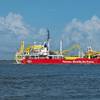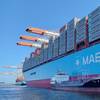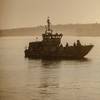Merchant Mariners? When the public's attention is preoccupied with the 9/11 anniversary and with sword rattling about a pre-emptive strike on Iraq, how do merchant mariners enter our consciousness? The simple answer is that they don't. To most Americans, merchant mariners are out of sight and out of mind, despite our absolute dependence upon them in peace and in war. More than ninety percent of everything that we consume in our peacetime global economy - from our morning coffee to the car that takes us home from work - has traveled on a ship. The vast majority of international trade with the United States is on foreign flag ships with foreign crews. Our military depends on both American and foreign merchant mariners to sustain their operations. Desert Storm and Desert Shield demonstrated our reliance on foreign merchant ships and crews. Even sensitive military cargo was routinely shipped on foreign merchant ships until the United States Maritime Administration recently halted shipping military cargoes on foreign ships after the Coast Guard was alarmed by discovering missile warheads in a container on a Bahamian merchant ship at Port Newark that was commanded by a Yemeni master. It turned out that Raytheon Corporation was shipping the cargo under a U.S. Navy contract. Meanwhile, the United States is providing our ally against terrorism, Yemen, with military equipment and training to help that country set up its own Coast Guard - including training Yemeni officers at the U.S. Coast Guard Academy.
Merchant mariners' gallant response to 9/11 is likewise unfamiliar to most Americans. Within moments of the attack on the World Trade Center, the ports of New York and New Jersey were sealed. All tunnels and bridges from Manhattan were closed. The only escape for hundreds of thousands of workers in lower Manhattan was by watercraft. The unsung heroes of that terrible Tuesday morning were brave mariners who operated more than one hundred vessels through smoke and debris to evacuate almost one million people from lower Manhattan. Some ships, especially those with dangerous cargos, were ordered to shift their moorings. Some had to leave the harbor. All merchant mariners, both foreign and American, were restricted to their ships. American and foreign merchant mariners confirmed their resolve against terrorism by assisting security authorities move vessels to safe moorings, by supporting security searches of their vessels and by uncomplainingly enduring strict security measures. A senior Coast Guard official told me how impressed he was by the way merchant mariners cooperated with all of the rigorous security measures imposed after September 11.
Shamefully, as long-term port security measures were gradually established to replace the emergency responses to 9/11, security authorities seem to have forgotten merchant mariners' contributions to our economy and to our security. On the contrary, since 9/11 mariners have been subjected to more and more restrictions under the guise of maritime security. In contrast to commercial air crews, who are perceived by the authorities as potential victims of terrorism and as partners in preventing terrorism, merchant mariners are perceived to be potential terrorists, despite their proven dependability and the dearth of evidence linking merchant mariners with security risks. Most foreign merchant mariners spend extended periods at sea with long work hours and in cramped living conditions without contact with their families. Denying shore leave so severely affects the mental and physical state of seafarers that the U.S. Supreme Court recognized shore leave as an "elemental necessity." Since 9/11, immigration controls have been tightened and the Immigration and Naturalization Service has detained many crews on their vessels. Even some private terminals do not allow any mariners to leave their ships - irrespective of any immigration restrictions.
Consequently, many seafarers are not allowed to step off their vessels in American ports even to make a phone call to their families from the dock or to obtain basic medical care. In some cases, shipowners have been ordered by the Coast Guard to place security guards, at their own expense, on vessels where the Immigration Service has restricted crews to their ships. Few of these restrictions have been based on any known security risks; rather, almost all INS imposed merchant vessel crew detentions have been related to technical visa issues or on the basis of the mariners' nationality. Since 9/11 merchant mariners and their employers have found it increasingly difficult to obtain crew visas.
The Center for Seafarers' Rights is concerned that wholesale restrictions on merchant mariners shore leave is counter-productive to our port security. Merchant mariners want to be recognized for their dependability, and they want to cooperate with measures that are reasonably calculated to enhance security. However as they see that the restrictions on their legitimate activities bears little connection to any security risk, the "national security" rationale mantra wears thin, and they will become increasingly disgruntled.
The international community of nations, seafarers' organizations and the maritime industry are cooperating with the United States in the International Maritime Organization, the International Labor Organization and the Congress to enhance maritime security. Some of the proposals under consideration relate establishing standards for reliable, positively verifiable and internationally acceptable seafarers identification cards. Such initiatives should be supported. We need reliable tools to help us recognize legitimate professional merchant mariners and distinguish them from others who would do us harm. This would enhance port security as well as increase shore leave opportunities for eligible seafarers.
Our first step is to change perceptions about merchant mariners. Remembering the horrors of 9/11, we need to enlist all of the help that we can to fight terrorism. The International Maritime Organization will hold a special meeting September 9 through 13 in London to finalize international maritime security standards. Let's hope that the United States will take a leading role at the meeting by acknowledging the contributions that merchant mariners, both foreign and domestic, have made and that recognize them accordingly. Rather than treating merchant mariners as potential terrorists, identify them as potential victims of terrorism and as allies in the war against terrorism. They, more than any others, want to rid their ranks of imposters who jeopardize their security and ours.
The Center for Seafarers' Rights of the Seamen's Church Institute is a worldwide resource for legal research, education, advocacy and assistance on seafarers' rights issues. The Center provides free counseling and referrals to merchant seafarers and seafarers' welfare agencies worldwide. The Center also works to improve national and international laws and practices protecting seafarers and improving maritime safety. CSR participates in IMO meetings, States Parties to the United Nations Law of the Sea Convention in New York City, and the International Labor Organization in Geneva.
Before joining the Seamen's Church Institute as Director of the Center for Seafarers' Rights in 1990, Mr. Stevenson served 20 years as a U.S. Coast Guard Officer, retiring as a Commander. While in the Coast Guard, Mr. Stevenson served in a variety of legal and operational assignments, including command at sea and a diplomatic post at the United States Mission to the United Nations. He is a graduate of the United States Coast Guard Academy and the University of Miami School of Law. The Seamen's Church Institute's mission is to advance the personal, professional, and spiritual well being of mariners worldwide. Established in 1834, SCI is an ecumenical agency affiliated with the Episcopal Church. To learn more about SCI, please visit www.seamenschurch.org
Featured videos

Tracking Foreign Vessels Working in the U.S. Jones Act Market

Inmarsat Enhances Service to Drive Digitalization

Inside the Electrified Truckable Tug
Subscribe for
Maritime Reporter E-News
Maritime Reporter E-News is the maritime industry's largest circulation and most authoritative ENews Service, delivered to your Email five times per week









